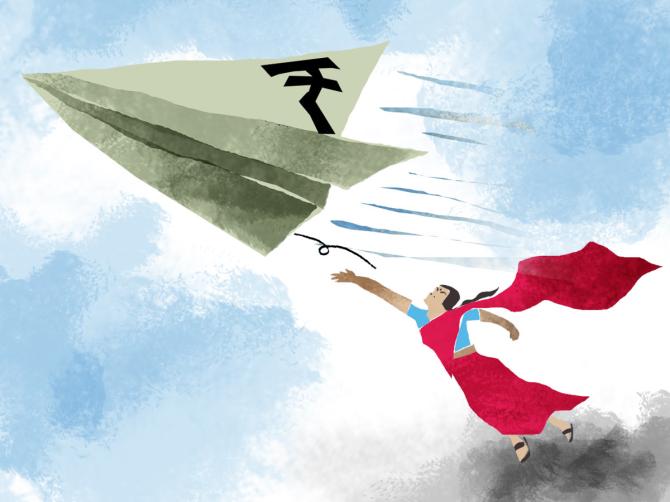'...where new faces are often thought to not have as much talent as the incumbent ones.'
'India's economic fundamentals are not being reflected in the credit ratings.'

"Rather than cutting and pasting from advanced economies, we should use basic economic principles to think about what is right for India at the stage of development at which we are," Chief Economic Advisor Krishnamurthy Subramanian tells Shrimi Choudhary.
You bat for big government spending. But how will this fiscal expansion be funded?
I said that the fiscal rules should be framed in a way that they enable counter-cyclical policy.
Funding would come from the combination of divestment revenues and borrowing and of course tax and non tax revenues as well.
About keeping balance between domestic and external borrowings, those are the aspects that the survey has not gotten into.
The basic intent is to talk about the importance of counter-cyclical fiscal policy as intrinsically every economy has ups and downs, and it reduces the amplitude of these variations.
When the economy is doing well, the government steps back and consolidates its fiscal finances, and if the economy is not doing that well, it fills the void that has been created by the private sectors, whether it's from the consumption or investment side.
If intrinsically, the cycle is sharper than counter-cyclicality, it makes that cycle much lower and reduces macroeconomic uncertainties.
Then private agents realise that even if there is a shock, the government may move in and act counter-cyclically to remove uncertainties and that increases the investment.
So, rather than cutting and pasting from advanced economies, we should use basic economic principles to think about what is right for India at the stage of development at which we are.
According to the Economic Survey, printing more money does not necessarily lead to inflation and a debasement of the currency, but could -- if invested in projects with positive societal value -- actually be beneficial to citizens. Are you suggesting more monetisation?
After the global financial crisis, the literature in finance and economics are now coming together and they work more in synergistic.
Before the global financial crisis, macroeconomics, for instance, did not have the financial sectors at all in its work and that's where the American finance association presidential address by Patrick Bolton (Barbara and David Zalaznick Professor of Business at Columbia University) fits in.
So his work has been highlighted in this context, where he basically talks about sovereign debt and taking learnings from corporate financing to talk about sovereign debt.
The idea is that if you actually borrow and make an investment and that investment generates a greater return than the interest you have to pay, then that project is worthwhile. That is the basic idea.
Are you advocating for free vaccines for all?
Vaccination is very important in enabling demands to come back in contact sensitive service sectors.
The basic idea that we are recommending that vaccination is very important and necessary outlay needs to be made for that to happen.
The Survey lauds farm laws and says these will empower farmers, but farmers do not agree. What is it that the beneficiaries don't buy the government arguments?
The economics of the farm laws is very clear, especially the one related to small and marginal farmers.
These farmers in the current situation do not have other options.
If the small farmers have to go and sell to a group in an agricultural produce market committee, which knows that this small farmer does not have another option, then obviously, the group will extract the maximum surplus in that relationship.
But if I tell you that look if you won't give me the right price, I can go and sell it to the other group then you will actually respond and give me the right price.
That is the fundamental, which John Nash had shown in his Nobel Prize-winning work about this market-based trades.
So what the farm laws basically do is to provide that option, so once the small farmer says that I don't need to sell it to you and I have another option, the value that he gets goes up significantly even within the APMC (Agricultural Produce Market c=Committee).
That is the economics of these laws.
However, there are other dynamics which are going on, some misinformation in the case of agriculture.
Economics is very clear that it will benefit the small farmers and even the International Monetary Fund commended this and said that it indeed will help the small farmers.
GDP growth predicted by the last three economic surveys was quite lower than the actual growth rates. What makes you confident that the growth would be more or less the same as projected by the Survey this time?
This year, all bets were off because of the pandemic, as we are facing once-in-a-century crisis.
The Survey says the economy is in a V-shaped recovery, but the core sector data showed that it declined 1.3 per cent in December.
It was a third straight month of contraction.
Given the restrictions that were imposed and we are still amidst the pandemic, the key point to remember is from the 23.9 per cent decline in Q1 which is basically the downward part of the 'V', we improved to 7.5 per cent in Q2.
Even after Q1, estimates that had come, I had mentioned that there is a V-shaped recovery which basically means that from having Q1 contraction, we were gathering some momentum and the prediction for the Q3 may be marginally positive or marginally negative and then positive growth in Q4.
The uncertainty is yet not over. This is not in India but across the world when households face uncertainty, and even some of the service sectors which are the crucial part of the economy are still affected by the contact-sensitivity and the social distancing.
However, as the vaccination programmes proceed ahead, these contact sensitive sectors will actually get their vibrancy back.
But even though the vaccination drive is going fast, we haven’t yet reached the large part of the population.
You said India is an outlier in terms of rating agencies grade to the economy. All three rating agencies have given India the lowest investment grade. What should be the ideal rating for India, according to you?
What we have said that, on various parameters, India's economic fundamentals are not being reflected in the credit ratings.
For instance, the ability to repay, as we know rating is nothing but the reflection of probability of default, which itself is a function of the willingness to repay and ability to repay.
In terms of willingness, India's ability to repay is gold standard even in 1991, faced with the worst-ever crisis of the payment imbalance in history, we actually shipped gold to England to honour our obligations.
On the ability to repay, if you take out the total obligations, including the private sectors' foreign exchange obligations, our reserves are greater than that.
It means that even if every private sector firm has foreign exchange obligations and they approach the Reserve Bank, seeking foreign exchange, to repay, each one of them together, including a minuscule amount of sovereign as well can be taken care of.
Similarly, if a company which has a lot of cash sitting on his books then the debt has to repay, you have to just dig into the cash and pay the debt in full, which means the probability of default is actually zero, which is what conveys the fundamentals.
We have been internally deliberating with the rating agencies, regulators and other stakeholders about this.
You also said fiscal policy should not be constrained by ratings. But investors do make their decisions on the basis of ratings. How should this be addressed?
There is a large literature the survey mentioned about, which highlights some of these biases that are there.
If you look at the advanced economy when it became the fifth largest economy, the ratings had been triple A, but when China became the fifth largest economy, the ratings were several notches lower.
Same thing is true for India as well.
It is related to something like last year in Bollywood where new faces are often thought to not have as much talent as the incumbent faces, it is basically the manifestation of that.
Various earlier export policies such as SEZ, National Manufacturing Zones have not been able to make India manufacturing an export hub. What is so special in production-linked incentive (PLI) schemes that it will do so?
One, PLI actually incentivises growth.
The earlier incentives did not have that aspect, the taxpayers money was being democratised without providing any incentives for growth.
Exports are a very very competitive area, and in the international markets, it's quality that matters.
With size, quality also comes, as economies have scaled and that aspect was missing in the earlier policies, which is now there in PLI schemes.
Second, some of the important structural rigidities that were there in labour markets, the MSME definitions, ease of doing business were not addressed.
So just giving incentives, that are not well designed, will not work.
But now, instead the structural rigidities are being addressed and at the same time the incentives are being provided for growth.
You said CPI (Consumer Price Index) does not capture changing eating habits of the people. In that context, are food items required to have much less weight than 46 per cent in CPI?
CPI is currently based on the 2011 consumer survey.
In the last ten years, the incomes have gone up which have pushed people towards more protein-rich items such as milk and pulses.
So the food basket changes, but CPI is not reflecting those.
The Survey says RBI intervention in the forward markets ensured financial stability and orderly conditions and have been largely successful in controlling the volatility and one-sided apprehension of the rupee.
However, the US treasury has put India on a currency manipulator watch list due to these policies.
I think the Survey is reviewing the external sectors and the broad policy.
I think some of these minute intricacies are best addressed by the Reserve Bank.













 © 2025
© 2025